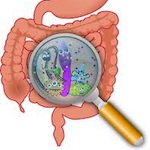I’m fascinated by gut flora and the clear impact our flora can have on our overall health. Considered to be a new human organ by many reputable medical sources, and one of the most significant medical discoveries of all time, the microbiome is as unique to each person as is a finger print. More importantly though, the bacteria (and other microbes) in our gut can dictate our risk for many important health conditions, from heart disease to cancer.
All of this is very significant because through new technologies in stool testing our microbiome can be genetically determined, and according to this article referencing a clinical study published in the journal Nature, we have the ability to change our microflora simply by changing our diet. The implications of this are huge for people with chronic health conditions and when put into clinical practice, the results can be outstanding.
The most significant and rapid impact on health that I have seen in my clients that are brave enough to focus on altering their gut flora, have been in the areas of mental health, including anxiety, depression, obsessive compulsive behaviours and bipolar disorder. In virtually every case of anxiety and/or depression that we have tested using genetic stool analysis, we have found some alteration in gut flora, involving several different kingdoms.
The major kingdoms of organisms found in peoples guts include fungi, protozoa and bacteria. As fungi and protozoa are predominantly opportunistic, removing these organisms from a persons gut through selective treatments has often had a profound effect on anxiety and/or depression on its own. Following the removal of opportunistic organisms, our focus falls onto balancing the bacterial populations in the gut using pharmaceuticals, herbs or diet. Although patience may be needed in some cases, more times than not, people feel the effects of these changes fairly quickly.
The following article outlines how quickly the flora diet changes can impact the microbiome. This is especially interesting to me right now because of the changes my flora must be going through with such a high fat diet. We’ve got to keep these bugs on their toes (or should I say filopodia)!
Microbiome Adapts to Diet Change in a Day
Posted on Medscape by Dr. Ricki Lewis, PhD December 12, 2013
The human gut microbiome is well known to adapt during the long term to a changing diet, but a study published onlineDecember 11 in Nature shows that this adaptation can happen in a day.
Chronic illnesses related to nutrition and digestion, such as obesity and inflammatory bowel disease (IBD), may arise at least in part from microbiome changes that parallel the fatty and sugary diets that many Westerners follow.
Lawrence A. David, PhD, from the FAS Center for Systems Biology and the Society of Fellows, Harvard University, Cambridge, Massachusetts, and colleagues examined how quickly the nature and numbers of gut microorganisms responded to change to a completely animal-based vs plant-based diet among 10 volunteers. The participants were aged 21 to 33 years, and their body mass indexes ranged from 19 to 32 kg/m2.
The animal-based diet included meats, cheeses, and eggs, and the plant-based diet included grains, legumes, vegetables, and fruits. In general, the authors note, carnivores need to digest more protein, whereas herbivores need to digest more carbohydrates.
Six male and 4 female volunteers ate what they wanted within the confines of the diet for 5 consecutive days. Five ate plant-based foods and 5 followed the animal-based diet. Tracing dyes were used to track the location of the foods within the gastrointestinal tracts, and the participants recorded food intake, how they felt, and bowel movements.
The animal-based diet increased dietary fat intake from 32.5% ± 2.2% of kilocalories to 69.5% ± 0.4% of kilocalories, and dietary protein from 16.2% ± 1.3% to 30.1% ± 0.5% of kilocalories, with zero fiber intake. The plant-based diet increased dietary fiber intake to 25.6 ± 1.1 g per 1000 kilocalories, while at the same time, fat and protein intake fell to 22.1% ± 1.7% and 10.0% ± 0.3% of kilocalories, respectively. Although the participants consumed equal numbers of kilocalories, weight fell only among those on the animal-based diet.
The researchers analyzed 16S ribosomal RNAs to identify microbiome components in fecal samples, which were collected for several days before the dietary changes and each day during the study.
The animal-based diet clearly had a greater effect on the microbiome than the plant-based diet. Even after 1 day, the microbiome of those eating the animal-based diet differed significantly from baseline analyses.
Overall, the animal-based diet favored bile-tolerant microorganisms (Alistipes, Bilophila, andBacteroides) at the expense of species (Roseburia, Eubacterium rectale, and Ruminococcus bromii) that metabolize dietary plant polysaccharides. These changes echo microbiome adaptation in wild populations of carnivores and herbivores.
Fecal bile acid profiles also changed among the meat-eaters, indicating increased enteric deoxycholic concentrations, which are associated with liver cancer and IBD. The bile-tolerant bacterium Bilophila wadsworthia is a likely candidate for causing or increasing risk of developing IBD.
A limitation of the study is the small sample size. However, the rapid change in the microbiome is a new finding that warrants additional study, the researchers write.
“Together, these findings are consistent with the hypothesis that diet-induced changes to the gut microbiota may contribute to the development of [IBD],” the researchers conclude.
The authors have disclosed no relevant financial relationships.
Nature. Published online December 11, 2013. Full text
